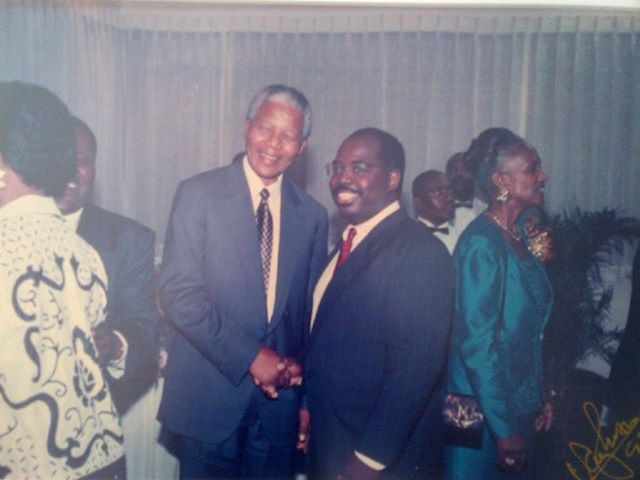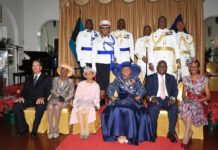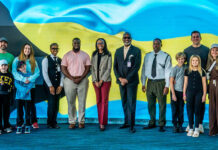
REMARKS BY
THE HON. PHILIP E. DAVIS, MP
DEPUTY PRIME MINISTER AND MINISTER OF WORKS & URBAN DEVELOPMENT
AT THE
THE HOUSE OF ASSEMBLY
ON
WEDNESDAY, 18TH DECEMBER, 2013
RESOLUTION ON NELSON MANDELA
Mr. Speaker,
I am indeed honoured to join this House in paying special tribute to the life of a great global icon, a symbol of freedom, a giant of Liberty and Justice throughout the world and a voice that powerfully called for the creation of opportunity for all.
Nelson Rolihlahla Mandela – the humble shepherd boy from the Eastern Cape community of Qunu – told the world a story that is parallel to the biblical story of Joseph while playing a role on this great world stage that was like the biblical account of Moses.
Born into a royal household, Mandela developed an early thirst for education and, despite his family’s influence in that part of rural impoverished South Africa, he chose a road to freedom that was not easy.
His early childhood years were simple and taught him many life lessons while his mature years brought ups and down – just like the rolling hills of Qunu.
Having been sheltered as a child from the pains of injustice and inequality, as a man Madiba began to share his disagreement with Apartheid System and quickly found himself standing front and centre against the system, flexing his newly found skills in the law while displaying what had become a raw hatred for Apartheid.
As a growing voice in his African National Congress [ANC], Mandela began to awaken the world to the injustices being practiced in South Africa at the time. He began to vent his growing concerns about a repressive system that marginalized people, holding them in a brutal chokehold, a system that reeked oppression, injustice and discrimination.
Lest we forget, South Africa before Nelson Mandela was really not a pretty picture.
And what was it like, we might ask?
In laying the case in a lecture at the College of the Bahamas on August 21st 1986, Sir Lynden Pindling delivered the Rationale for Sanctions against South Africa.
In his book “The Vision of Sir Lynden Pindling: In His Own Words”, compiled and edited by Patricia Beardsley Roker, we read:
“The elements which apartheid shares with segregation are but a tip of the iceberg. Beneath them lie a carefully developed network of hundreds of laws systematically refined to guarantee white supremacy.”
Sir Lynden then shared a snapshot of what South Africa was really like before Nelson Mandela:
– The Prohibition of Mixed Marriages Act and the Immorality Act outlawed marriages and sexual relations between races.
– The Population Registration Act divided the population into racial, ethnic, and cultural categories – while persons of European origin despite their differences were exempted from such classifications. This law redistributed land in South Africa offering 83.3 per cent of the land to whites and 13.7 per cent to blacks.
– Apartheid Acts in the South African Parliament made it an offense for different races to be educated – in the same schools. And specified the level of education available to each.
In short, Apartheid meant a generational systematic denial of educational opportunities for blacks encased in law.
– In further examples of oppression, taxes were imposed on Black Education Authorities in South Africa with the intent to make education UNAFFORDABLE or too expensive for the masses….
South Africa before Nelson Mandela saw teachers teaching blacks earned far less than the lowest salaries of those teaching whites. And, in addition to this, while some companies ran remedial courses for workers, it was an offense to provide night classes for black workers.
The Pass Laws of South Africa were the most resented. The identity card tracked the movement of blacks who were treated as foreign in South Africa.
Additionally, buses, schools, cinemas, swimming pools, park benches – and the like – were all segregated.
Pindling in his lecture described these atrocities in South Africa as an “iniquitous policy”.
Our own great liberator – Sir Lynden Pindling – believed that the time was NOW – to look into the future of a New South Africa often spoken about and envisioned by Nelson Mandela.
Madiba had by this time stirred the attention of the world and called for a New Day – A New Beginning – a New Season of Hope for the people of South Africa.
And so October 20th 1985, Commonwealth Heads from around the world gathered in Nassau, The Bahamas and heeded the call by this great son of South Africa to demand change halfway around the world!
The momentous milestone that was the Nassau Accord reached by the Commonwealth Heads during that meeting marked a revolutionary shift in policy by Great Britain, which finally and reluctantly joined CHOGM leaders in breaking the back of Apartheid in South Africa by calling for sanctions against the repressive regime.
The Leaders Wrote: “We call on the authorities in Pretoria for the following steps to be taken in a genuine manner and as a matter of urgency:
“Declare that the system of apartheid will be dismantled and specific and meaningful action taken in fulfillment of that intent.
“Terminate the existing state of emergency.
“Release immediately and unconditionally Nelson Mandela and all others imprisoned and detained for their opposition to apartheid.
“Establish political freedom and specifically lift the existing ban on the African National Congress and other political parties.
“Initiate, in the context of a suspension of violence on all sides, a process of dialogue across lines of colour, politics and religion, with a view to establishing a non-racial and representative government.”
With the Nassau Accord, we can see that it is true that no nation is too small to effect change in the world and no people are too few to demand the right to be heard.
And so, from his Robben Island dungeon of torment, Nelson Mandela became a symbol of hope. He became the voice of Freedom. He became a figure of justice in the face of injustice and his voice grew louder all around the world.
And, while a prisoner, his vision for a better world became even clearer. He became a gleaming, polished South African jewel, catching the attention of every nation and – more importantly – the people of South Africa.
And in that moment, as he turned the page to a new chapter in his life, he gave new meaning to the words forgiveness and reconciliation.
Nelson Mandela was indeed a strong man, but also a very simple man, a man who fell in love with People of the world. And man who forgave and displayed that forgiveness.
He displayed the gift of perseverance and hope, standing firm in his views against oppression, while always keeping the people in the forefront of his efforts. As one commentator said this past week: Nelson Mandela as a great political leader and statesman fell in love with people and the people fell in love with him.
He once said: “Men of peace must not think about retribution or recrimination. Courageous people do not fear forgiving, for the sake of peace.”
As a peacemaker Nelson Mandela was prepared to act as mediator wherever he saw war and, when South Africa almost slipped into despair and began to fall apart, he locked hands with his fellow citizens of all races and creeds, determined not to let his country go down that road.
He was a man of dignity, unity, and peace, fighting for a non-racial, nonsexist South Africa.
He was a humble man, who gave attention to the commoner while calling on Kings, Presidents, Prime Ministers and Parliaments around the world to bring greater attention to the poor, the unemployed, the weak and the disenfranchised.
What to me is most captivating with Madiba was his ability to communicate at all levels and was always pointing to the great future he saw for the world.
In 2008, at a Hyde Park concert in London celebrating his 90th birthday, Nelson Mandela echoed a call to the world, saying he saw his life long journey in the struggle for equality coming to an end. Addressing that gathered audience of over 50,000 persons, Madiba said: “It’s in your hands now”.
Truly it is in our hands now – to take that beacon of Change and ignite the flames of liberty and justice for all citizens, all over the world.
“It’s in our hands now” to seek peaceful resolutions in Syria, Guinea, Liberia, Nigeria, Sierra Leone, and Togo. And in East African nations like Ethiopia, Somalia, Sudan, and Uganda, and in Central Africa, in countries including Burundi, Democratic Republic of the Congo, Rwanda.
“It’s in our hands now” to eradicate poverty, hunger and famine all around the world.
“It’s in our hands now” to encourage a society that eradicates diseases, forever expanding healthcare to reduce people’s suffering.
Madiba would tell us all “It’s in our hands now” to fight against White Domination and Black Domination; to shape our country with freedom and justice for all, regardless of skin colour.
“It’s in our hands now” to exercise tolerance, forbearance and charity in the world; all of which are ingredients for lasting peace.
“It’s in our hands now”
May the soul of Nelson Rolihlahla Mandela rest in peace.
Mr. Speaker, Cat Island, Rum Cay and San Salvador support the resolution.
END…..







